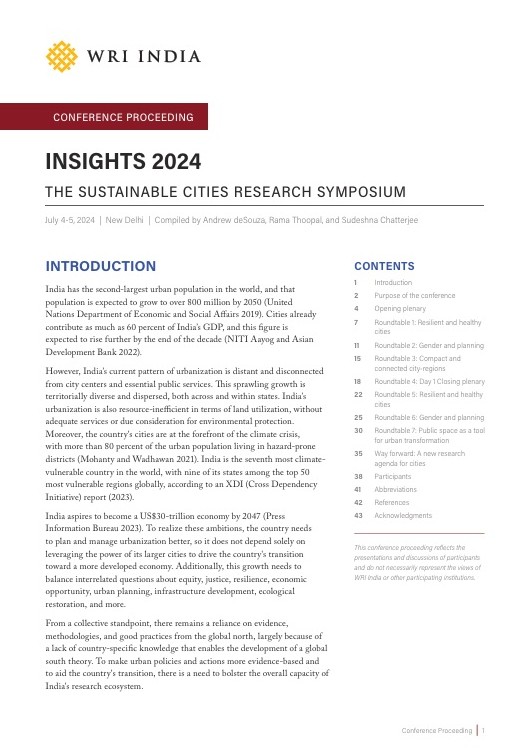How a Climate-Proofed MSME Sector Can Drive Tamil Nadu’s EV Leadership
by -This article was originally published in the Hindu on 26 October 2023.
Tamil Nadu is gearing up to be a global vehicle (EV) manufacturing hub, with the government seeking to attract ₹50,000 crore in investments and envisioning 1.5 lakh new jobs in the EV sector in the next five years. Investments worth almost ₹40,000 crore are already underway, and as per recent data, Tamil Nadu is one of the largest EV manufacturing states in India, producing more than 40% of all registered EVs and 46% of electric two-wheelers.
Yet, Micro, Small, and Medium Enterprises (MSMEs) hold the key to unlocking the potential of these investments and future growth.
MSMEs are Backbone of TN’s Economy
Contributing significantly to the State’s as well as the country’s GDP, MSMEs are financially vulnerable, dependent on fossil-based energy, and in need of significant technological upgradation and efficiency improvements. Tamil Nadu manufactures 35% of India’s automotive components - a sector that is largely driven by MSMEs and contributes to 8% of the State’s GDP. Not only does this make MSMEs the backbone of the State’s economy but also crucial in the growth of Tamil Nadu’s emerging EV industry.
Most EV components are currently imported but the EV component market is projected to grow at a CAGR of 22% until the end of the decade. This presents MSMEs with a huge opportunity as EV manufacturers are keen to localize their component base to bring greater flexibility, customization and quality control while reducing costs, import dependence, and potential supply chain disruptions (as experienced during Covid). It also means significant new investments and manufacturing capabilities can be built in newer components such as motors and controllers, battery management systems, chargers and charging stations, amongst others. From the State’s perspective, EV-ready MSMEs have the potential to create new and greener jobs, especially for women in a sector that has traditionally been male dominated.
However, a transition to EVs will also need to ensure that existing Internal Combustion Engine (ICE) component manufacturers, especially those at the risk of losing business as certain components become obsolete, are able to diversify to EV component manufacturing or allied sectors.
Therefore, building MSME capabilities and sustenance needs to be in sync with the investments being made by auto companies to support Tamil Nadu’s transformation to a global EV manufacturing hub.
Upskilling and Just Transitions
Building future-ready MSME’s would require skilling and upskilling: as traditional ICE component manufacturers transition to EVs, a significant share of MSMEs and their workforce could be at risk of losing business and livelihoods. To ensure a just transition, such businesses will need awareness on evolving market trends and opportunities in EV component manufacturing. Additionally, they will need hand-holding and support with go-to-market strategies, innovative and hands-on skilling programs catering to existing workforce - both white and blue collar, and incentives to undertake skilling of workers.
Upgrading Curriculum in Technical Institutes
This needs to be complemented with upgradation of curriculum in technical institutes, providing short-term trainings and apprenticeships for fresh graduates, including women, to create a green workforce for the future. Moreover, as a new and evolving sector, manufacturing EV components will also need significant investments in R&D, testing centers and common facility centers to support design and innovation as well as to ensure high standards of quality. Tamil Nadu has taken a lead in this direction through its decision to establish E-mobility centers in state-owned polytechnic colleges, initiating redesign of curriculum and establishing common facility centers to meet the burgeoning EV industry requirements.
Decarbonizing MSMEs
MSMEs will also need to become greener over time as global and Indian auto brands undertake climate targets requiring suppliers, mostly MSMEs, to report and manage their carbon emissions and energy use. Staying competitive in an increasingly decarbonizing world will require MSMEs to undertake interventions to manage their environmental impact by understanding their emissions sources and reduction options. Such actions have the potential to bring in efficiencies and reduce operating costs. While MSMEs currently lack the capacity to undertake such initiatives, significant awareness building, trainings and concessional finance will enhance their ability to undertake climate action and stay competitive.
Becoming Climate Resilient
Climate-related extreme events such as heatwaves and floods are already impacting life, livelihoods and productivity in India. International Labour Organisation’s 2019 report suggests that by 2030 India may account for 34 million of the projected 80 million global job losses from heat stress associated productivity decline. To ensure Tamil Nadu’s MSMEs are better equipped to manage these challenges, it is important to understand their current and future climate vulnerabilities. Sharing knowledge about such impacts, and the institutional and individual actions needed to build resilience and safeguard health and business, will greatly aid MSMEs towards a resilient future.
Tamil Nadu’s updated EV policy outlines a range of measures to enhance skilling, finance and manufacturing capabilities of MSMEs. Private and non-profit-led initiatives must support the state in operationalizing such policies in ways that address current and future needs of MSMEs. With a thriving and future-ready MSME sector coupled with a skilled workforce, Tamil Nadu can demonstrate how becoming a global EV manufacturing hub can be achieved while ensuring a just and inclusive transition.
All views expressed by the author are personal.


